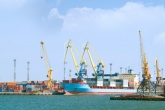China uncovers over 500k tonnes of illegal waste in latest crackdown
Chinese customs authorities have intercepted over 500,000 tonnes of illegal waste under the ‘Blue Sky 2020’ anti-smuggling campaign and plan to continue the crackdown on illicit domestic and foreign waste imports.

This led to the capture of 80 criminal suspects and the seizure of 598,800 tonnes of illicit imported waste, such as waste oil and slag, in an ‘intensive, clustered and full-chain manner’.
The GAC also announced that Chinese imports of solid waste are down 42.5 per cent year-on-year, totalling 3,225,000 tonnes between January and May of this year. Solid waste smuggling cases have also seen a decrease of 58.1 per cent year-on-year, with the GAC handling 81 criminal cases despite the disruption caused by the global Covid-19 pandemic.
The 'Blue Sky' initiative was first launched in a 2018 campaign, which cracked down on illegal imports of 24 grades of waste banned earlier that year. This followed in the vein of previous campaigns including 2013's Operation Green Fence and 2017's National Sword Campaign.
The Chinese Government plans to continue the crackdown on illegal waste smuggling through deeper law-enforcement cooperation with both domestic and foreign authorities, in order to ‘safeguard domestic eco-environment and human health’.
Since China’s 2018 ban on 24 grades of solid waste, including post-consumer plastics and unsorted mixed papers, many waste exports have been diverted to other markets, particularly in Southeast Asia. Plastic waste exports to Malaysia tripled and exports to Thailand increased by fifty times since the start of 2018.
This provoked new import restrictions in these countries, with Malaysia banning the import of plastic waste altogether, and Thailand intending to do the same from 2021 as they struggle under the weight of these imports.
These diverted imports have had a significant environmental and health impact, with the flood of plastic waste into Southeast Asian countries leading to the contamination of water supplies, crop death, respiratory illness and a rise in organised crime, according to a report by the Global Alliance for Incinerator Alternatives (GAIA). The report called on wealthy nations to reduce their production and consumption of single-use plastics and take responsibility for the safe disposal of this waste.
The disruption to export markets has hastened moves to regulate the export of plastic waste in particular, with 186 countries agreeing to place restrictions on the movement of plastic waste by amending the Basel Convention in 2019.
In the UK, MPs had been placing pressure on the government to ban the export of plastic waste to developing countries in early 2019, with the government responding by including such a ban in its Environment Bill, which is currently passing through Parliament.











